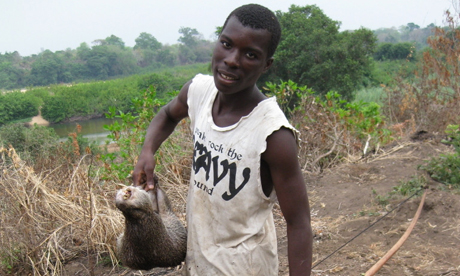Ridley Road Market row – is eating cane rat really any different to eating zebra?

Hunter with a cane rat in Buzi district of Mozambique. Photograph: Ton Rulkens
The Ridley Road market meat scandal uncovered this month by the BBC has raised some very serious questions for both Hackney and the country as a whole.
The most grave of these is in relation to public health. Guy Lynn’s report unearthed the depressing failure of Hackney Council to monitor and curb the selling of untraceable and unverifiable meat in Dalston, with no food safety enforcement visits to the area recorded since 2009. This is particularly astonishing following quite recent BSE and swine flu outbreaks, when we are all aware of how disastrous the consequences of contaminated meat can be.
But there are other issues that also need to be addressed.
What of the people in the African community who are in fact choosing to buy Ghanaian cane rat from Dalston butchers? There is clearly a market in east London for this type of bush meat, otherwise butchers and shops would not sell it and risk facing prosecution.
Large, herbivorous cane rats are now farmed as livestock within Ghana, Cameroon and Nigeria and commonly used in stews. They are not the British, flea-ridden ‘rats’ with which we associate the word. Neither are they an endangered species: one of the main reasons why much African ‘bushmeat’ is outlawed by the EU.
It’s clear that when it comes to food, there’s no accounting for taste. In France, they are known for the raw mince dish ‘steak tartare’; on the Italian island of Sicily, you can indulge in some ‘casu marzu’ – or maggot cheese – and in Scotland, there is of course the fondly regarded dish of innards boiled in sheep’s stomach known as haggis.
The food you consume mainly comes down to what you’re accustomed to and what is readily available to you where you live: apart from with vegans and vegetarians, it’s rarely a matter of principle. Illegalities and health dangers aside for one moment, is eating cane rat really much worse than eating pig, cow or zebra?
Reports in the media about Ridley Road market seemed to suggest as much, using the word ‘rat’ to reinforce the unsanitary and dangerous nature of the meat sold to their undercover reporter.
But surely question should always have been “Why are you selling illegal meat?” rather than “Why are you selling rats?” as one shopowner was asked. The fact that the meat was cane rat meat or from any other animal is of little relevance. What matters is the fact it was illegal, a health hazard and the result of criminal activity.
In west and central London, members of the middle and upper classes are happily chowing down (legally) on exotic African meats such as zebra, alligator and antelope in top restaurants like Archipelago. Meat that – as it goes – is far less sustainable as a food source than that of cane rat.
It is likely that most African people who want to buy cane rat would much prefer to buy this kind of meat in a safe way, should that option be locally accessible and financially viable for them. Therefore consideration should be given to the future legal import and availability of specialist meats to the people who are from their country of origin and who don’t want to cook or eat them as mere novelty.
Perhaps only then can the issue of this controversial meat trade be resolved.
Related:
‘Let them eat rat’ says diversity expert over Ridley Road Market bushmeat row
